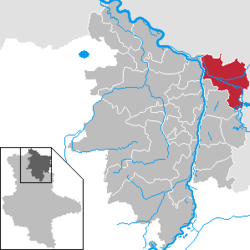Havelberg
| Havelberg | ||
|---|---|---|
| ||
 Havelberg | ||
Location of Havelberg within Stendal district  | ||
| Coordinates: 52°49′30″N 12°4′28″E / 52.82500°N 12.07444°ECoordinates: 52°49′30″N 12°4′28″E / 52.82500°N 12.07444°E | ||
| Country | Germany | |
| State | Saxony-Anhalt | |
| District | Stendal | |
| Government | ||
| • Mayor | Bernd Poloski | |
| Area | ||
| • Total | 149.13 km2 (57.58 sq mi) | |
| Population (2015-12-31)[1] | ||
| • Total | 6,619 | |
| • Density | 44/km2 (110/sq mi) | |
| Time zone | CET/CEST (UTC+1/+2) | |
| Postal codes | 39532–39539 | |
| Dialling codes | 039387 und 039382 | |
| Vehicle registration | SDL | |
| Website | havelberg.de | |
Havelberg is a town in the district of Stendal, in Saxony-Anhalt, Germany. It is situated on the Havel, and part of the town is built on an island in the centre of the river. The two parts were incorporated as a town in 1875. It has a population of 7,687 (2004).
History
The Bishopric of Havelberg was founded in 946, though the bishop tended to live in either Plattenburg or Wittstock, which were a few miles north of Havelberg. The most famous bishop was Anselm. Havelberg is home to a former monastery, now used as the Prignitz-Museum, which was established in 1904.
Havelberg used to be part of Brandenburg for most of its history. But when the German States where dissolved in East Germany in 1952, Havelberg became part of the district of Magdeburg. The German States were refounded during the German reunification in 1990. However, the whole district of Magdeburg became part of Sachsen-Anhalt then – including the former Brandenburgian town of Havelberg.
Daughters and sons of Havelberg
- Bruno Keil (1859–1916), classical philologist.
- Singer Annett Louisan was born here in 1977.
References
- ↑ "Bevölkerung der Gemeinden – Stand: 31.12.2015" (PDF). Statistisches Landesamt Sachsen-Anhalt (in German).
